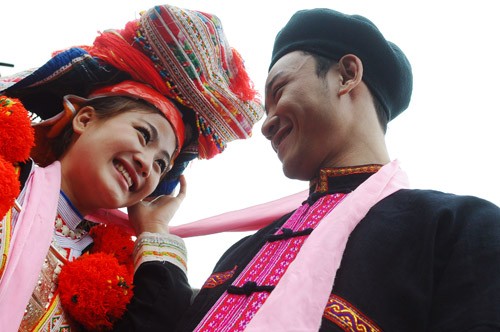(VOVworld) – Panpipes are an integral part of the spiritual life of the red Dao ethnic minority in Vietnam. The red Dao only play the panpipes at weddings and maturity rituals, not at festivals or funerals as other ethnic minorities do. They say the sound of panpipes brings joy and happiness. Thieu Nghiep reports:
Without the sound of panpipes a wedding of the Dao would be less joyful. The sound of panpipes signals a joyous day for the family and for the entire village. It makes everyone excited and happy for the ones celebrating. Trieu Thi Nhay of Phuc Loi commune, Yen Bai province, said: “The red Dao only play the panpipes at weddings and maturity rituals although nowadays very few families hold maturity rituals because they are very costly and time consuming. The sound of panpipes makes everyone, particularly young couples, excited and happy. This peculiar cultural feature of the red Dao is like no other of other ethnic minority groups.”
The panpipes play an important role in the lives of the red Dao. At a wedding, panpipes are played with different melodies to match specific moments. For example, the first panpipe melody is longer and more cheerful to show the feelings of the groom’s family when they accompany the bride and her relatives to the groom’s home. The panpipes are played 8 more times with different melodies which include: one to welcome the bride to the groom’s home, one to remind the couple to bow to the ancestors, one to show gratitude to the parents, one to welcome guests, and one to see off relatives who accompanied the bride to the groom’s home. The most significant and interesting melody is one to show gratitude to the parents. The rhythm is slow, conveying the sadness of the bride who is about to leave her place of birth for her husband’s home. The melody, in the name of the bride, thanks her parents for giving birth to her, raising her and teaching her to become a good wife and daughter-in-law. Panpipes are often accompanied by drums, gongs, and cymbals at a wedding. The red Dao play the panpipes at breakfast, lunch, and dinner and to welcome guests who come to share the joy of the family. They play 5-7 minutes each time.
 |
Trieu Quy Kim of Phuc Loi commune, Yen Bai province, has been playing panpipes for 16 years: “It’s not difficult to learn to play the panpipes but more importantly we must understand the meaning and context of each melody. We, first of all, should be able to differentiate the context of each melody.”
Despite rapid social changes, the red Dao have been preserving their cultural traditions. For one generation after another, panpipes have been played at weddings in the hope that the couples will be bound in happiness and love forever.